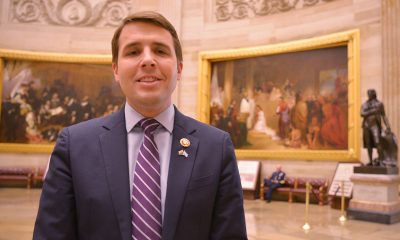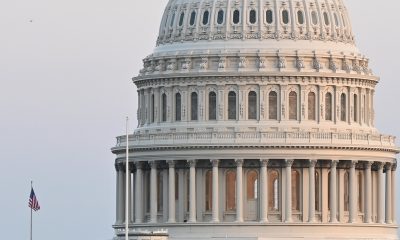News
Senate Dems take series of actions to assist LGBT youth, elders
Lawmakers call for reinstatement of survey questions, introduce LGBT elder legislation
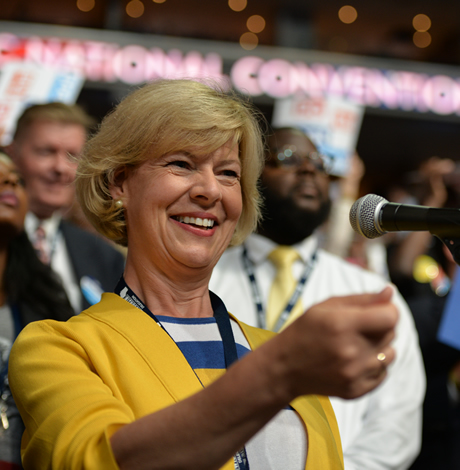
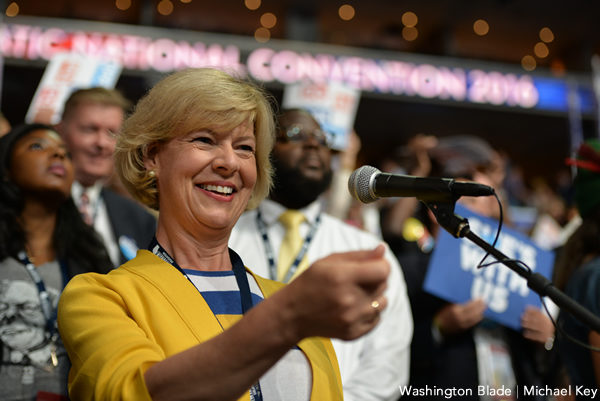
Sen. Tammy Baldwin signed letters and introduced legislation aimed at helping LGBT youth and elders.
(Washington Blade file photo by Michael Key)
Senate Democrats took a series of actions Tuesday seeking to assist the LGBT community — one action for the LGBT youth, two others for LGBT elders — both of which are subgroups that have a history of unique challenges.
In a pair of letters dated Nov. 7, U.S. Sens. Robert Casey (D-Pa.), Tammy Baldwin (D-Wis.) and Patty Murray (D-Wash.) led 21 senators in calling on the Trump administration to ensure programs designed to combat youth homelessness reach LGBT people and include LGBT elders in health surveys.
Meanwhile, U.S. Sen. Michael Bennet (D-Colo.) — along with Sen. Jeff Merkley (D-Ore.), Edward Markey (D-Mass.) and Al Franken (D-Minn.) — introduced the LGBT Elder Americans Act, which seeks to improve services available for LGBT elders.
The letters, sent to both the U.S. Justice Department and the U.S. Department of Health & Human Services, bases its call to action on President Trump’s promise during his 2016 campaign to be a friend to LGBT people.
“During the campaign, President Trump said that he would ‘do everything in [his] power to protect LGBTQ citizens.’ We write to you because the administration is not living up to the president’s promise,” the senators wrote. “We urge you to reverse course on actions that will make it more challenging for programs you oversee to serve LGBTQ Americans.”
Specifically, the letter to the Justice Department expresses concern two federal grant programs that combat homelessness — DOJ’s Mentoring for Child Victims of Commercial Sexual Exploitation & Domestic Sex Trafficking Initiative and HHS’ Street Outreach Program — will no longer focus on LGBT youth because this year’s funding requirement “removed that requirement as well as all mentions of LGBTQ youth.”
“As LGBTQ youth are at a higher risk for running away and becoming homeless compared to their peers, and therefore more likely to be victimized, we are concerned about the effect these administration decisions would have on these vulnerable youth,” the letter says.
Meanwhile, the letter to the Department of Health & Human Services calls for restoration of questions allowing respondents to identify as transgender in the National Survey of Older Americans Act Participants as well as LGBT on the Centers for Independent Living Annual Program Performance Report. (HHS has previously removed the sexual-orientation question from the NSOAPP, but reinstated it under public pressure.)
“In order to ensure that key programs for older adults and people with disabilities are meeting the needs of the entire LGBTQ community, we once again reiterate our call for HHS to restore the gender-identity question to the NSOAPP and to collect information on sexual orientation and gender identity on the CILPPR,” the letter says.
Additionally, the letter expresses concern about the withdrawal of a proposed HHS rule that would have clarified same-sex spouses should are afforded equal rights in nursing homes that receive Medicare and Medicaid. That rule was widely seen as redundant after the U.S. Supreme Court ruling for marriage equality nationwide.
Neither the Justice Department, not the Department of Health & Human Services, responded to the Washington Blade’s request to comment on the letter.
Meanwhile, the LGBT Elder Americans Act, reintroduced by Bennet, would build on the Older Americans Act to include LGBT seniors as a vulnerable population and permanently establish the National Resource Center on LGBT Aging.
“Our laws and research are not current in addressing the unique needs of the aging generation of baby boomers,” Bennet said in a statement. “This legislation would provide LGBT seniors, who often face significant barriers to accessing health care, with targeted services and resources. By helping aging service organizations assist older LGBT adults and permanently establishing a National Resource Center, we will better meet the needs of the LGBT community.”
Baldwin, who’s running for re-election in the U.S. Senate next year and remains the only out lesbian in Congress, also emphasized the importance of the LGBT Elder Americans Act in a statement.
“We should guarantee all of our seniors access to the care that truly meets their needs and so I am proud to advance this legislation that will improve services and support for LGBT older adults,” Baldwin said. “Too many LGBT older adults carry the harmful physical and emotional health effects of having lived through a lifetime of discrimination. It is past time we do something about it and strengthen the Older Americans Act to better support our LGBT seniors.”
Last week, Rep. Suzanne Bonamici (D-Ore.) — along with Rep. Ted Deutch (D-Fla.) and Charlie Crist (D-Fla.) — introduced companion legislation in the U.S. House known as the Ruthie & Connie LGBT Elder Americans Act, named for two LGBT elders who continue to fight for LGBT equality.
Michael Adams, CEO of the LGBT elder group SAGE USA, commended the lawmakers for introducing the legislation in a statement.
“LGBT elders, whose courage in the face of danger and adversity paved the way for progress on LGBT equality in recent years, deserve to be taken care of as they age, no matter where in the United States they live,” Adams said. “Our LGBT elder pioneers did not lead the movement birthed at Stonewall by being silent. We at SAGE follow their example by raising our voices in support of the Ruthie & Connie LGBT Elder Americans Act of 2017 and to demand justice for this growing population.”
U.S. Military/Pentagon
Pentagon urged to reverse Naval Academy book ban
Hundreds of titles discussing race, gender, and sexuality pulled from library shelves

Lambda Legal and the Legal Defense Fund issued a letter on Tuesday urging U.S. Defense Secretary Pete Hegseth to reverse course on a policy that led to the removal of 381 books from the Nimitz Library of the U.S. Naval Academy in Annapolis, Md.
Pursuant to President Donald Trump’s executive order 14190, “Ending Radical Indoctrination in K-12 Schooling,” the institution screened 900 titles to identify works promoting “diversity, equity, and inclusion,” removing those that concerned or touched upon “topics pertaining to the experiences of people of color, especially Black people, and/or LGBTQ people,” according to a press release from the civil rights organizations.
These included “I Know Why the Caged Bird Sings” by Maya Angelou, “Stone Fruit” by Lee Lai, “The Hate U Give” by Angie Thomas, “Lies My Teacher Told Me: Everything Your American History Textbook Got Wrong” by James W. Loewen, “Gender Queer: A Memoir” by Maia Kobabe, and “Democracy in Black: How Race Still Enslaves the American Soul” by Eddie S. Glaude, Jr.
The groups further noted that “the collection retained other books with messages and themes that privilege certain races and religions over others, including ‘The Clansman: A Historical Romance of the Ku Klux Klan’ by Thomas Dixon, Jr., ‘Mein Kampf’ by Adolf Hitler, and ‘Heart of Darkness’ by Joseph Conrad.
In their letter, Lambda Legal and LDF argued the books must be returned to circulation to preserve the “constitutional rights” of cadets at the institution, warning of the “danger” that comes with “censoring materials based on viewpoints disfavored by the current administration.”
“Such censorship is especially dangerous in an educational setting, where critical inquiry, intellectual diversity, and exposure to a wide array of perspectives are necessary to educate future citizen-leaders,” Lambda Legal Chief Legal Officer Jennifer C. Pizer and LDF Director of Strategic Initiatives Jin Hee Lee said in the press release.
Federal Government
White House sues Maine for refusing to comply with trans athlete ban
Lawsuit follows months-long conflict over school sports in state

The Justice Department is suing the state of Maine for refusing to comply with President Donald Trump’s executive order banning transgender athletes from participating in school sports, U.S. Attorney General Pam Bondi announced on Wednesday.
DOJ’s lawsuit accuses the state of violating Title IX rules barring sex discrimination, arguing that girls and women are disadvantaged in sports and deprived of opportunities like scholarships when they must compete against natal males, an interpretation of the statute that reverses course from how the law was enforced under the Biden-Harris administration.
“We tried to get Maine to comply” before filing the complaint, Bondi said during a news conference. She added the department is asking the court to “have the titles return to the young women who rightfully won these sports” and may also retroactively pull federal funding to the state for refusing to comply with the ban in the past.
Earlier this year, the attorney general sent letters to Maine, California, and Minnesota warning the blue states that the department “does not tolerate state officials who ignore federal law.”
According to the Maine Principals’ Association, only two trans high school-aged girls are competing statewide this year. Conclusions from research on the athletic performance of trans athletes vis-a-vis their cisgender counterparts have been mixed.
Trump critics and LGBTQ advocates maintain that efforts to enforce the ban can facilitate invasive gender policing to settle questions about an individual athlete’s birth sex, which puts all girls and women at risk. Others believe determinations about eligibility should be made not by the federal government but by school districts, states, and athletics associations.
Bondi’s announcement marked the latest escalation of a months-long feud between Trump and Maine, which began in February when the state’s Democratic governor, Janet Mills, declined to say she would enforce the ban.
Also on Wednesday, U.S. Education Secretary Linda McMahon said the findings from her department’s Title IX investigation into Maine schools — which, likewise, concerned their inclusion of trans student-athletes in competitive sports — was referred to DOJ.
Earlier this month, the Justice Department pulled $1.5 million in grants for Maine’s Department of Corrections because a trans woman was placed in a women’s correctional facility in violation of a different anti-trans executive order, while the U.S. Department of Agriculture paused the disbursement of funds supporting education programs in the state over its failure to comply with Title IX rules.
A federal court last week ordered USDA to unfreeze the money in a ruling that prohibits the agency from “terminating, freezing, or otherwise interfering with the state’s access to federal funds based on alleged Title IX violations without following the process required by federal statute.”
United Kingdom
UK Supreme Court rules legal definition of woman limited to ‘biological women’
Advocacy groups say decision is serious setback for transgender rights
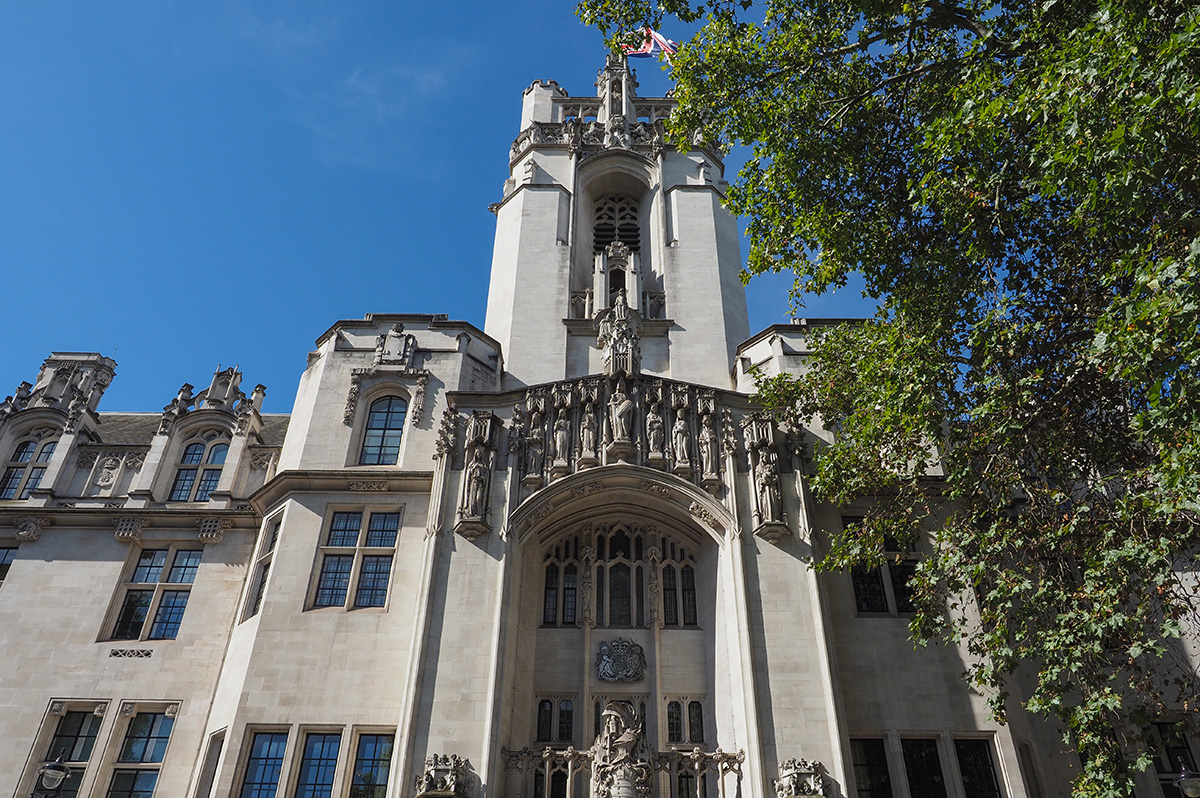
The British Supreme Court on Wednesday ruled the legal definition of a woman is limited to “biological women” and does not include transgender women.
The Equality Act that bans discrimination based on sexual orientation and gender identity took effect in 2010.
Scottish MPs in 2018 passed a bill that sought to increase the number of women on government boards. The Supreme Court ruling notes For Women Scotland — a “feminist voluntary organization which campaigns to strengthen women’s rights and children’s rights in Scotland” — challenged the Scottish government’s decision to include trans women with a Gender Recognition Certificate in its definition of women when it implemented the quota.
Stonewall U.K., a British advocacy group, notes a Gender Recognition Certificate is “a document that allows some trans men and trans women to have the right gender on their birth certificate.”
“We conclude that the guidance issued by the Scottish government is incorrect,” reads the Supreme Court ruling. “A person with a GRC (Gender Recognition Certificate) in the female gender does not come within the definition of ‘woman’ for the purposes of sex discrimination in section 11 of the EA (Equality Act) 2010. That in turn means that the definition of ‘woman’ in section 2 of the 2018 Act, which Scottish ministers accept must bear the same meaning as the term ‘woman’ in section 11 and section 212 of the EA 2010, is limited to biological women and does not include trans women with a GRC.”
The 88-page ruling says trans people “are protected by the indirect discrimination provisions” of the Equality Act, regardless of whether they have a Gender Recognition Certificate.
“Transgender people are also protected from indirect discrimination where they are put at a particular disadvantage which they share with members of their biological sex,” it adds.
Susan Smith, co-founder of For Women Scotland, praised the decision.
“Today the judges have said what we always believed to be the case, that women are protected by their biological sex,” she said, according to the BBC. “Sex is real and women can now feel safe that services and spaces designated for women are for women and we are enormously grateful to the Supreme Court for this ruling.”
Author J.K. Rowling on X said it “took three extraordinary, tenacious Scottish women with an army behind them to get this case heard by the Supreme Court.”
“In winning, they’ve protected the rights of women and girls across the UK,” she added.
It took three extraordinary, tenacious Scottish women with an army behind them to get this case heard by the Supreme Court and, in winning, they’ve protected the rights of women and girls across the UK. @ForWomenScot, I’m so proud to know you 🏴💜🏴💚🏴🤍🏴 https://t.co/JEvcScVVGS
— J.K. Rowling (@jk_rowling) April 16, 2025
Advocacy groups in Scotland and across the U.K. said the ruling is a serious setback for trans rights.
“We are really shocked by today’s Supreme Court decision — which reverses 20 years of understanding on how the law recognizes trans men and women with Gender Recognition Certificates,” said Scottish Trans and the Equality Network in a statement posted to Instagram. “The judgment seems to have totally missed what matters to trans people — that we are able to live our lives, and be recognized, in line with who we truly are.”
Consortium, a network of more than 700 LGBTQ and intersex rights groups from across the U.K., in their own statement said it is “deeply concerned at the widespread, harmful implications of today’s Supreme Court ruling.”
“As LGBT+ organizations across the country, we stand in solidarity with trans, intersex and nonbinary folk as we navigate from here,” said Consortium.
The Supreme Court said its decision can be appealed.
-

 The White House5 days ago
The White House5 days agoWhite House does not ‘respond’ to reporters’ requests with pronouns included
-

 District of Columbia2 days ago
District of Columbia2 days agoReenactment of 1965 gay rights protest at White House set for April 17
-

 Hungary2 days ago
Hungary2 days agoHungarian MPs amend constitution to ban public LGBTQ events
-

 Maryland2 days ago
Maryland2 days agoFreeState Justice: Transgender activist ‘hijacked’ Moore’s Transgender Day of Visibility event

